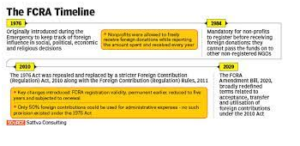What is FCRA, and when can an NGO’s registration be cancelled?
Why in News?
Recently, The Ministry of Home Affairs has cancelled the Foreign Contribution (Regulation) Act (FCRA) licence of the Rajiv Gandhi Foundation (RGF) and Rajiv Gandhi Charitable Trust (RGCT) for alleged violations of the provisions of the Act.
- The NGOs came under the scanner in July 2020 over the possible violations of the Prevention of Money Laundering Act, the Income Tax Act and the FCRA.
What is the FCRA?
The “Foreign Contribution (Regulation) Act” (FCRA) regulates foreign donations and ensures that such contributions do not adversely affect internal security.
- First enacted in 1976, it was amended in 2010 in which a slew of new measures was adopted to regulate foreign donations.
- The FCRA act is implemented by the Ministry of Home Affairs.
- Under the new rules notified by MHA in 2015, NGOs are required to give an undertaking that the acceptance of foreign funds is not likely to prejudicially affect the sovereignty and integrity of India or impact friendly relations with any foreign state and does not disrupt communal harmony.
Applicability:
The FCRA is applicable to all associations, groups and NGOs which intend to receive foreign donations. It is mandatory for all such NGOs to register themselves under the FCRA.
Provisions of the Act:
- The FCRA requires every person or NGO wishing to receive foreign donations to be registered under the Act.
- To open a bank account for the receipt of foreign funds in State Bank of India, Delhi is mandatory.
- These funds can be utilised only for the purpose for which they have been received, and as stipulated in the Act.
- The receivers of foreign funds are also required to file annual returns, and they must not transfer the funds to another NGO.
Who Cannot Receive Foreign Contributions?
- The Act prohibits the receipt of foreign funds by:
- Candidates for elections,
- Journalists or newspaper and media broadcast companies,
- Judges and government servants,
- Members of the legislature and political parties or their office-bearers, and
- Organisations of a political nature.
Registration under FCRA:
FCRA registrations are granted to individuals or associations that have definite cultural, economic, educational, religious, and social programmes.
- MHA makes inquiries through the Intelligence Bureau into the antecedents of the applicant and accordingly processes the application.
- The MHA is required to approve or reject the application within 90 days — failing which it is expected to inform the NGO of the reasons for the same.
- Once granted, FCRA registration is valid for five years.
- NGOs are expected to apply for renewal within six months of the date of expiry of registration. In case of failure to apply for renewal, the registration is deemed to have expired.
When is a registration suspended or cancelled?
The government reserves the right to cancel the FCRA registration of any NGO if it finds it to be in violation of the Act.
- Registration can be cancelled for a range of reasons including, if “in the opinion of the Central Government, it is necessary for the public interest to cancel the certificate”.
- Once the registration of an NGO is cancelled, it is not eligible for re-registration for three years.
Mains Link:
- Discuss the major provisions of the Foreign Contribution (Regulation) Act (FCRA) and the need for such legislation.




